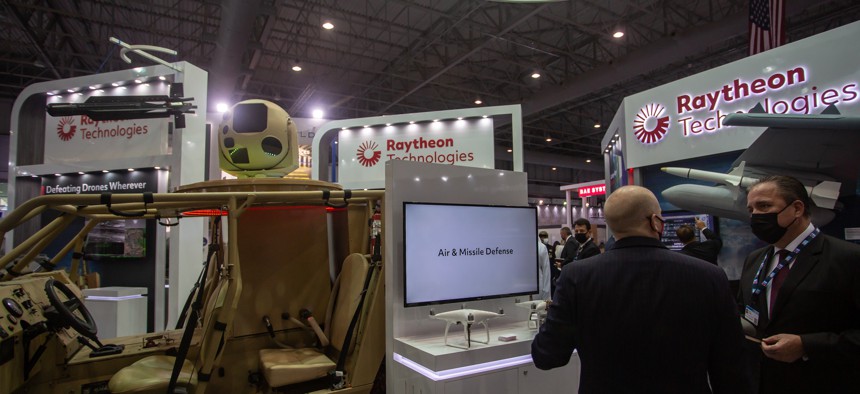Defense Firms Brace for Billions of Dollars in New Taxes, And Hope for Congressional Relief

Raytheon Technologies showcase their Air and Missile Defense System at the Dubai Airshow 2021.
If a 2017 law stays in place, there’s a fear U.S. companies would reduce research-and-development spending.
Defense companies are warning investors they could owe billions of dollars in additional taxes this April unless Congress repeals or defers a law that would tax research and development expenses.
Some say it will discourage American companies from making research-and-development investments at a time when the U.S. is increasingly competing with China both militarily and commercially.
“We firmly believe, and everybody we talk to in Washington understands, it is bad public policy,” Raytheon Technologies CEO Greg Hayes said Wednesday at a Barclays investment conference. “It discourages investment in innovation.”
Companies have been able to write off R&D expenses since 1954, but the 2017 Tax Cuts and Jobs Act requires companies to begin claiming R&D expenses on their taxes. The annual claims must be spread over a five-year period beginning in 2021.
“The requirement for companies to capitalize and amortize R&D expenses amounts to a significant tax increase, which will negatively impact innovation,” the National Defense Industrial Association, a trade group that represents more than 1,500 large and small firms, said in a recent assessment of the defense industry.
“They're still gonna invest in R&D. We're just losing that ability to incentivize more,” Eric Fanning, the CEO of the Aerospace Industries Association, said Wednesday.
The House version of the Biden administration’s Build Back Better social safety net bill would delay the R&D tax until 2026, but that legislation has been stalled in the Senate.
During recent earnings calls, executives began warning investors their companies would be hit with larger tax bills beginning this year if the 2017 law wasn’t repealed or delayed.
Raytheon said it spent about $11 billion on R&D last year, meaning it would have to claim about $2 billion on its taxes in April. Northrop Grumman estimates its tax hit being $1 billion. L3Harris Technologies estimates its bill being $650 million. Lockheed Martin, the world’s largest defense contractor, estimates its share being $500 million. General Dynamics and Textron each estimated a $300 million tax hit.
There’s “strong industry optimism that Congress will take corrective action sometime in 2022,” Jim McAleese, who runs the Virginia-based McAleese and Associates consulting firm, said in a Feb. 19 note to clients.
Meanwhile, China has increased its so-called “super deduction” for companies’ research-and-development work to encourage innovation.
“They're leaning into incentivizing and leveraging that private sector investment [and] that private capital investment, and we're disincentivizing it,” Fanning said.






